Are you a lactose-intolerant health buff? Or perhaps maybe you’re avoiding dairy as a part of your ketogenic diet? Whatever the reason, there are many plant-based protein powder options on the market.
There are many side effects to whey protein despite it being the most popular protein powder option out there.
Despite the fact that whey protein is one of the most effective sources of pure protein, it’s not at all that much better when it comes to overall nutrition.
Luckily, there are many plant-based options out there. In this article, we’ll be looking at seven of the best dairy-free protein powder options in the market.
Review Summary:
- 1. Performance Lab SPORT – Best Overall
- 2. Ultimate Nutrition Carnebolic
- 3. Ora Organic
- 4. Isopure Zero Carb
- 5. Optimum Nutrition Gold Standard 100%
- 6. Jay Robb
- 7. GNC AMP WHEYBOLIC™ RIPPED
Table of Contents
Best Lactose-Free Protein Powder (List for 2024)
With the recent rise of new health-oriented diets, it’s no surprise that many top-selling protein powders are lactose-free and plant-based. Of course, whey protein powders do have their own benefit: they contain at least 24 grams of protein per serving.
We don’t need to discuss how a high-protein diet helps with weight loss, helps to build muscle and overall health improvement. In fact, if you are not new to bodybuilding, you are probably familiar with a crowd favorite: the protein shake.
Protein shakes are popular because they’re easy to consume, and they’re fairly light before or after a heavy workout. Here are seven of the best plant-based protein powders in the market:
1. Performance Lab SPORT Dairy-Free Protein Powder – Best Overall Product
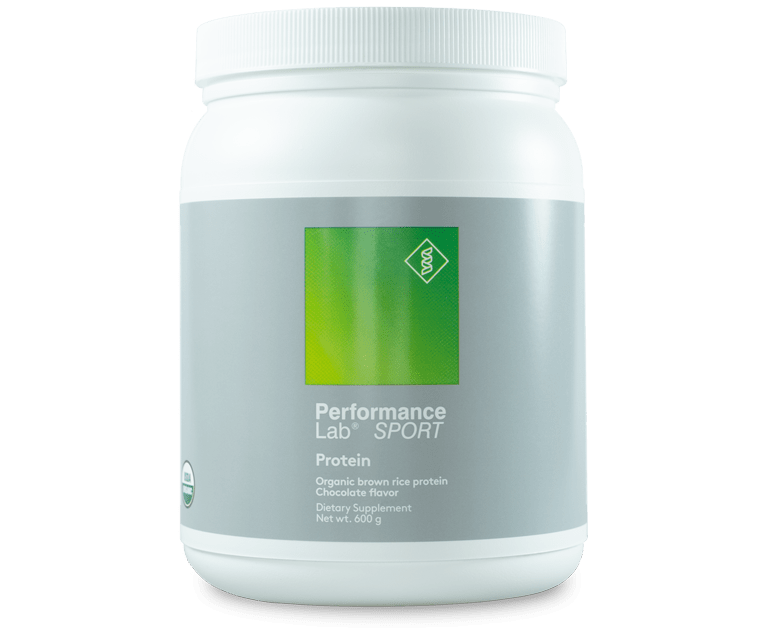
This Performance Lab SPORT organic brown rice protein features a patented concentrated formula that is built for the most serious athletes. Even if you’re using it as a daily boost, it will only serve to benefit you thanks to its unique formula that is proven to be as effective as whey in building muscle. Moreover, it’s also guaranteed to enhance your overall performance, endurance, strength, and gains.
Here’s why you’ll like it:
Great Absorption – this rice protein features leucine that allows your body to absorb it 30% faster than other powders in the market. This causes your body to react faster and to utilize most of its effects more efficiently since it isn’t competing with any of your bodily functions while you focus on working out.
- Facilitates muscle recovery
- Naturally suppresses appetite
- Delicious and flavorful with no artificial flavorings and sugars
- Bacillus coagulans ingredient that improves absorption
- A bit pricey
Summary: If you are under a tight budget, you might think the price is a *little* too steep. However, the patented blend makes it incredibly unique and quite effective compared to any other brand out there. I’m sure you’ll find a suitable alternative. However, it would not be as good as Performance Lab Sport Lactose Free Protein Powder. One of the best things about this product is that it contains absolutely no caffeine. That means no energy crashes and no negative side effects.
.
2. Ultimate Nutrition Carnebolic – Best Beef Protein Powder
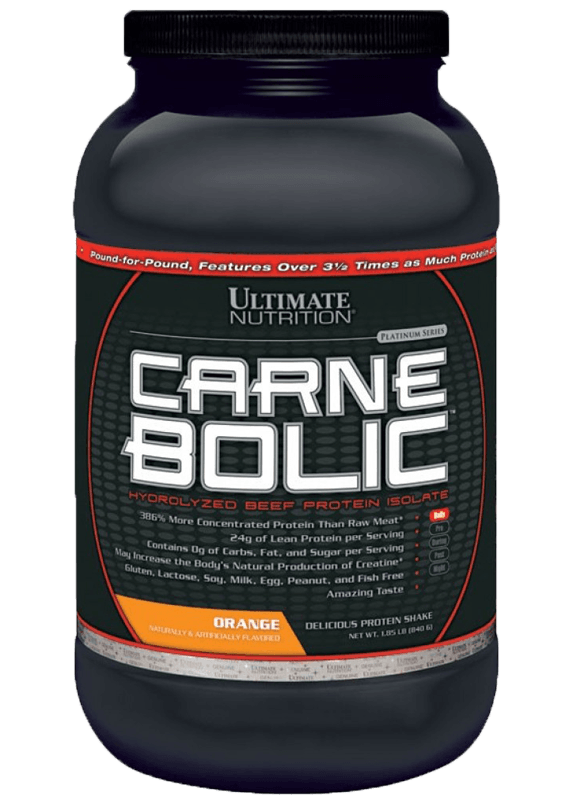
Carnebolic by Ultimate Nutrition is a beef protein powder that delivers the same amount of protein that each serving of whey provides. You’ll get 24 grams of pure protein per serving, which means you’re guaranteed to be stocking up on pure protein daily.
Moreover, it is lactose-free and soy-free protein, and it comes highly recommended for those who are practicing ketogenic diets. Moreover, it comes in different flavors, so you’re bound to find one that you’ll be able to tolerate.
Here’s what makes it unique:
High Protein Content – this hydrolyzed beef protein isolate features an 86% concentration of protein. This is higher than any standard beef protein powder that’s in the market and guaranteed to deliver pure primal goodness that shows in every flex of your muscle.
- High in protein
- No fat
- No carbohydrates
- No sugar
- Low-calorie count
- Good for post-workout
- Soy Free
- Does not blend well
- Tends to foam
- Does not taste very good
Summary: Unfortunately, if you are looking for something you can mix into your shakes, this might not be the best protein powder for you. It tends to foam heavily and would do better stirred or shook in a shaker bottle. Moreover, it does come in many flavor options but it does not taste very good. Fortunately though, if you have the guts to take it up to four times each day to see the best results, you’ll face ripped muscles with every move you make.
.
3. Ora Organic Vegan Protein Powder
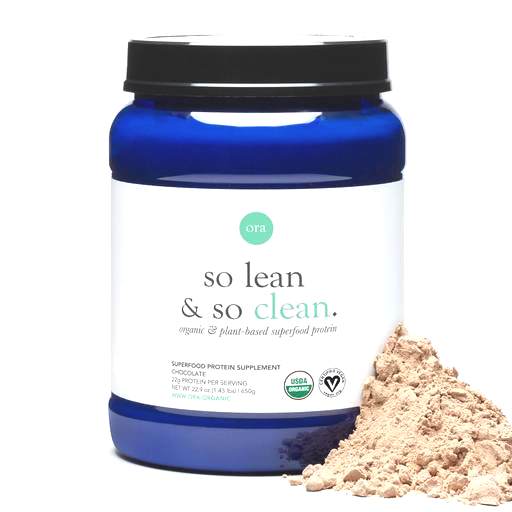
This Ora organic vegan powder encourages lean muscles and a clean boost in energy. It contains a complete amino acid profile, so you know your body is getting all the necessary BCAAs it needs to function and thrive. Moreover, if you’re worried about it, causing some kind of digestive distress, it is formulated with digestive enzymes to help your body digest it quickly and with no problems.
Here’s why you’ll like it:
Safe for Children – Whether you are worried about small children accidentally taking a swig of your protein drink or you’re thinking of helping your young one get a boost in proteins and other nutrients, this protein powder by Ora is safe for the consumption of young children. However, make sure you consult your child’s physician prior to giving any type of protein supplement.
- 22 gr. of protein per serving
- A unique blend of 20 organic superfoods
- Digestive enzymes to prevent bloating kt digestive distress
- No additives
- No artificial flavorings
- No artificial sweeteners
- Not a pure blend
- Comes flavored
Summary: This all-organic blend of superfoods and pure cocoa makes for a delicious and healthy protein-filled drink. You’ll appreciate how it doesn’t cause stomach distress and how it contains 22 gr. of protein per serving. Moreover, it also contains a complete amino acid profile so your body is getting all the nutrients it can’t produce on its own. The unique blend also means you are getting a boost of clean energy with no crashes. Moreover, it also encourages you to develop lean muscles.
.
4. Isopure, Zero Carb – Good For Weight Loss
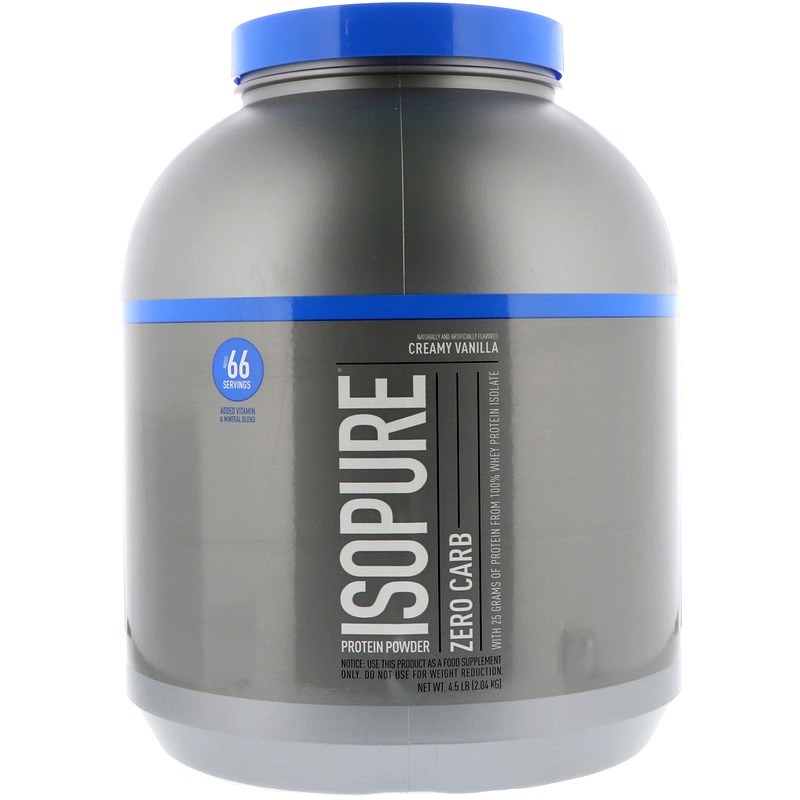
You’re probably wondering what Isopure is doing on this list. Truth be told, there are some formulations that claim to be so refined, lactose turns out to be so minimal in the powder.
This means you’ll be getting mostly whey protein intake with very little—if any, lactose. So what does this mean for you? It should not trigger your lactose intolerance. Isopure is one of the most renowned lactose-free whey protein supplements in the market.
Here’s why you’ll like it:
Added Nutrients and Vitamins – the one thing that makes this product so popular is that it’s unlike traditional supplements. It contains a blend of soy and milk components that add to the overall nutritional value of this unique supplement.
- Flavored naturally and artificially
- 25 grams of protein per serving
- 5 grams of BCAAs per serving
- Lactose-free
- Contains soy and milk
Summary: Contrary to claims, this lactose-free powder is not 100% free from lactose. It does contain soy and milk. Milk might cause digestive distress among other things if you are not careful. Soy on the other hand is simply not a very good ingredient to have in your protein powder. It does contain a hefty dose of protein per serving and 5 grams of BCAAs as well.
.
5. ON Gold Standard 100% – Great For Weight Gain
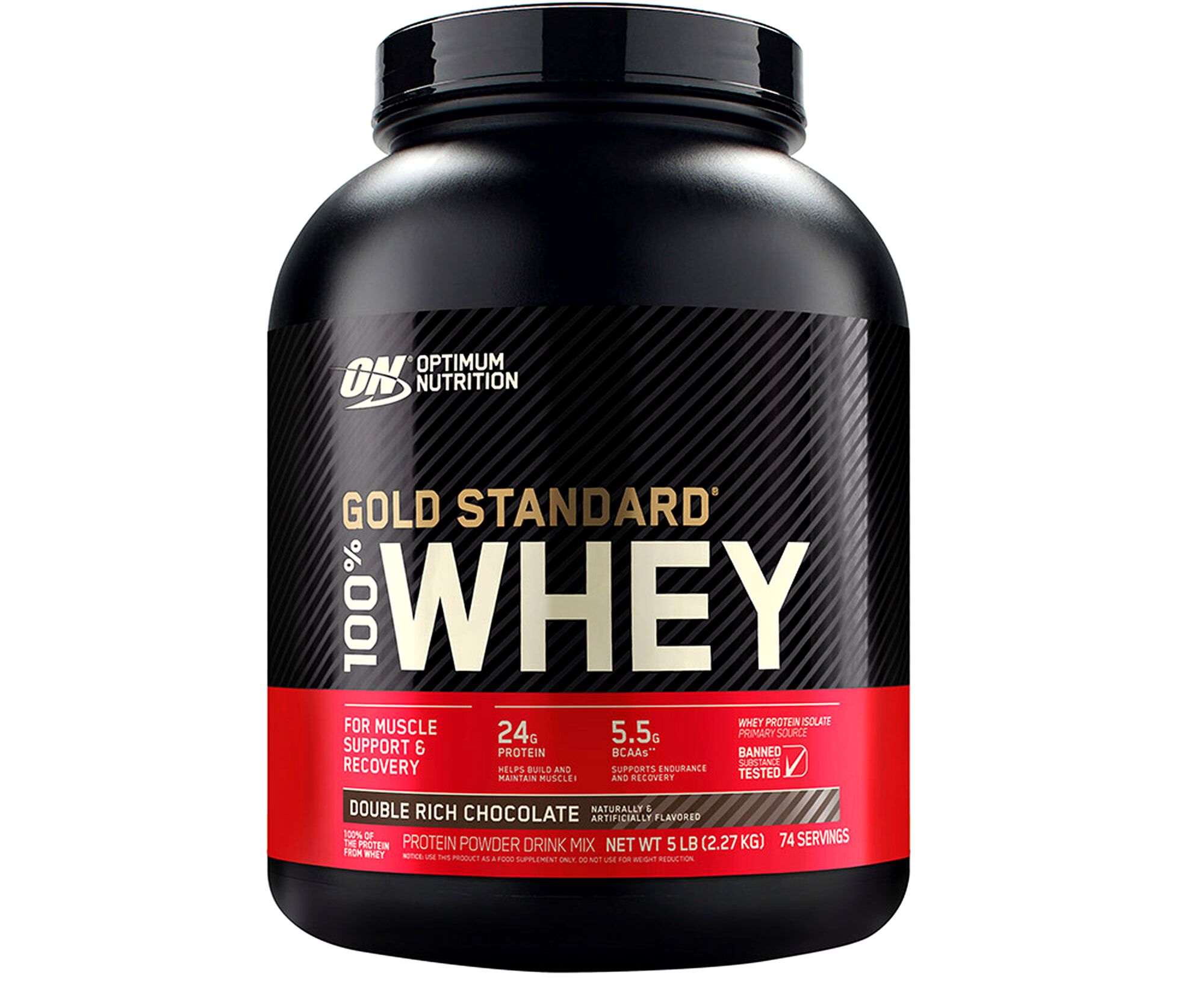
Optimum Nutrition Gold Standard is well-known as a viable lactose-free option if you want something that will help you reap the weight-gaining benefits of this powder without having to worry about lactose. It features an ultra-filtered formula that removes most of the lactose content in the whey protein.
What can this product do for you? Does whey have lactose?
Pure Protein and Nutrients – this high-quality protein source gives you 24 grams per serving. Moreover, you’ll also get more than 4 grams of natural glutamine and glutamic acid as well as 5 grams of leucine, isoleucine, and valine for every 31.5g scoop. Furthermore, you’ll be happy to hear that it is free from banned substances, so you are guaranteed to only be putting approved, healthy substances inside your body.
- The refined formula that is lactose-free
- Helps in building muscle and gaining weight quickly
- Contains a good dose of branched-chain amino acids per serving
- 24 grams of pure protein per serving
- Great mixability
- Instantized formula
- Quite expensive
- Might contain some lactose
Summary: If you are willing to brave the risk, many lactose-intolerant users swear by ON’s Gold Standard. Now, it might have some traces of lactose so you might still feel bloated or gassy at some time. Plus, it’s also quite expensive. However, it does feature a premium refined formula that removes most if not all of the lactose while incorporating naturally occurring BCAAs and 24 grams of pure product per serving.
.
6. Jay Robb Whey – Good For Muscle Gain
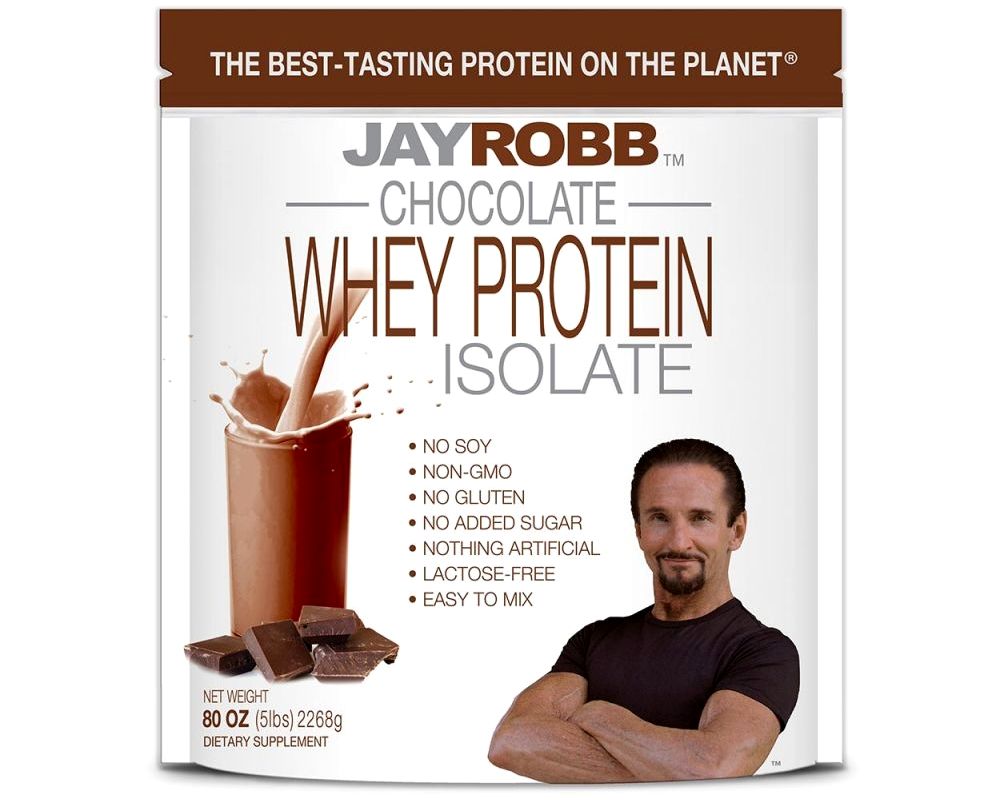
If you’re looking for something that can help you flaunt your guns, Jay Robb’s whey isolate protein is a good whey option to help you build your mass while keeping you from getting bloated and gassy. Moreover, it also helps, especially if you are allergic to lactose since its formula is refined enough to keep you sated without the negative effects.
Here’s why you’ll like it:
Sustainably Sourced – this powder is sourced from ethically sourced whey. You’ll be happy to know that it is sourced from grass-fed farm-raised cows that are well taken care of and have not been enhanced with growth hormones. This means it’s mostly organic and guilt-free.
Optimally Healthy – this unique protein powder not only gives a healthy dose of protein, but it also supports your immune system’s health and functions. Moreover, it is fat-free and cholesterol-free, so there’s no risk of it interfering with your diet. It’s also sugar-free and sweetened with stevia, and it’s free from MSG and casein as well.
- Lactose-free
- Gluten-free
- GMO-free
- Fat-free
- Cholesterol free
- Boosts your immune system
- Supports muscle gain
- No artificial sweeteners
- No artificial colorants
- Contains 110 calories per serving
- The packaging needs improvement
- Does not taste very good
Summary: Contrary to its “best tasting” claims, this powder does not taste very good, Moreover, the resealable pouch packaging is not a very good container. This means you might need to transfer it for better security. It also contains 110 calories per serving so it’s not ideal if you’re watching your calorie count. However, it is lactose free, gluten free and GMO free. It’s also sustainably sourced and an ideal protein powder if you are trying to gain weight altogether.
.
7. GNC AMP WHEYBOLIC™ RIPPED
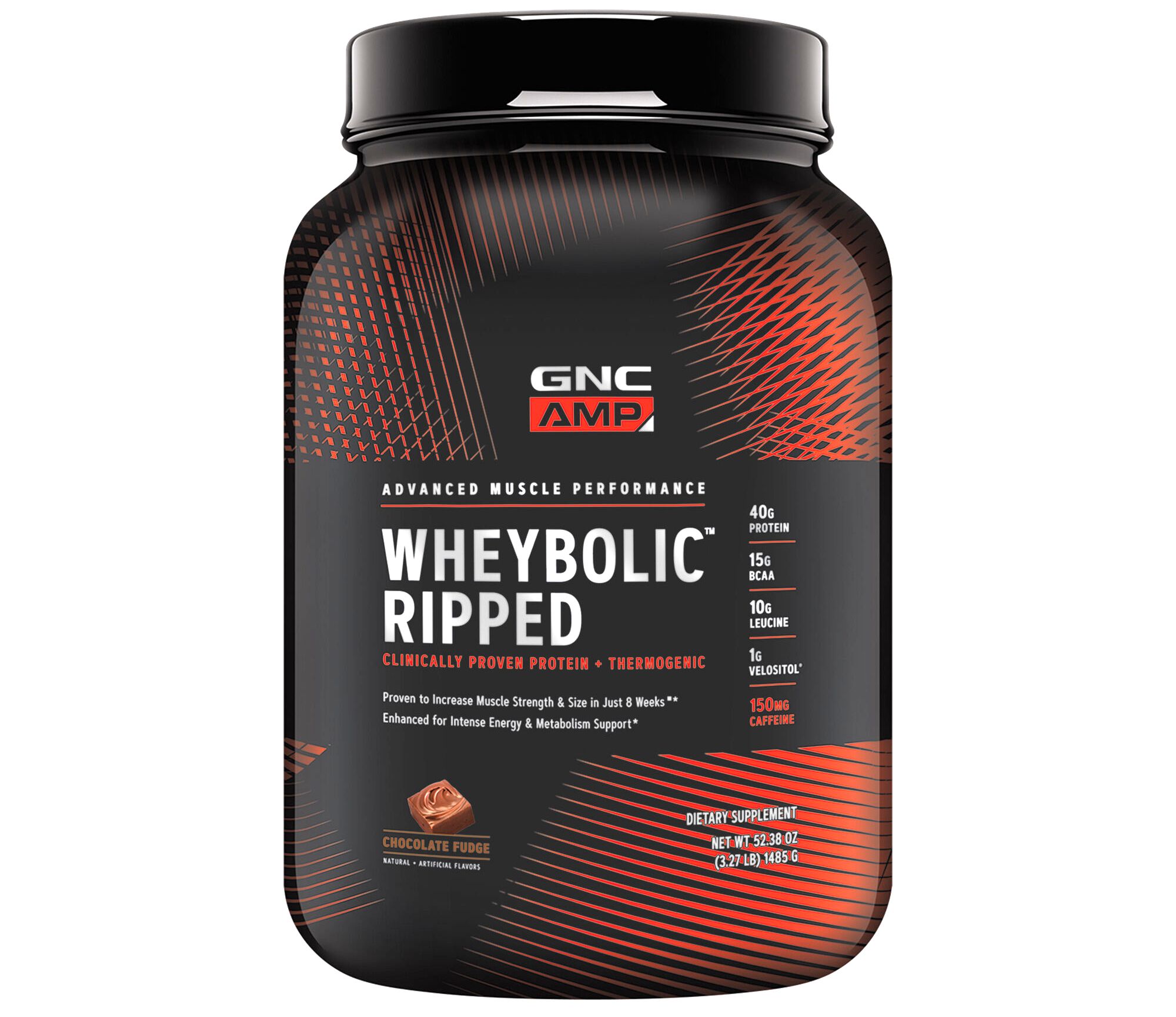
The Wheybolic helps you burn fats while building muscle. How? It features clinically proven protein sources and has a thermogenic nature to it. What does thermogenic mean, you ask?
It helps your body generate heat. In turn, this will also help you burn fats rapidly while you work out. It’s also ideal for those cold winter days if you want an extra pump of heat to keep you from feeling lazy and slacking on your workouts.
Here’s why you’ll like it:
Easily Digestible – this powder contains 40 grams of pure and premium digestive protein. This not only helps you see faster results, but it also helps keep you from bloating or feeling gassy. Moreover, this boosts the Velositol and ProHydrolase ingredients that allow your body to build muscles faster and more effectively.
Quick Acting – this product is ideal if you’re looking for something that can help you lay on the muscle in a short time. It’s proven to improve your muscle structure, strength, and girth within eight weeks.
- Easily mixes with water or other beverages
- Boosts focus and mental clarity
- Clean energy boost without crashes
- 40 grams of protein per serving
- 15 grams of BCAAs with 10 grams of leucine per serving
- Supports metabolism
- Does not taste very good
- May cause digestive distress
Summary: This meal replacement comes packed with many good benefits like enhanced energy, focus and clarity. However, it doesn’t taste as good as advertised and may cause you some stomach distress due to the lactose naturally present in whey. However, it is a premium source of protein since it contains 40 grams of pure protein per serving as well as 15 grams of BCAAs and 10 grams of leucine. Moreover, you’ll also be happy to know that the formula contains much needed digestive proteins to help your body digest it without any issues.
.
Product not included in this guide:
- muscle milk lactose free protein powder
Can I Have Protein Powder If Lactose Intolerant?
What’s the difference between skim and whole milk? We’ll show you the vitamins, minerals, and protein content of both. Plus, we’ll give you an idea of what size carton of whole milk is optimal for protein supplementation and how to get the best flavor and overall taste of your milk. Skipping Your Daily Calorie Limit Will Mean You’ll Have to Work Harder to Lose Weight. Use the few extra minutes you’ve got each day to plan out and stick to your nutrition plan.
Get into the habit of waking up every day, checking in with your body, and actually planning out meals and what you’ll eat that day. By sticking to your plan and tracking your intake, you’ll make it easier for you to see just how far you need to go on your diet to reach your goals. I’m very new to a vegan diet and wanted to ask if it is possible to have Whey protein Isolate powder without milk in it. I used to drink it daily but I was thinking of cutting down the amount as I have an intolerance to dairy. Do you think it would be fine to use it in capsules?
The Main Benefits of Taking Dairy-Free Protein Powders / Any Side Effects?
Dairy-free protein powders, in general, are ideal if you’re looking to veer away from the effects of dairy on your body. Let’s say you might be lactose-intolerant, or maybe you’re practicing keto diets or trying to go or gluten-free (more on this here). However, like anything, your lactose-free shakes might cause you some side effects you need to be aware of.
- First off, stay away from soy protein powders unless absolutely necessary. Soy protein powders are often over-processed and blended with a ton of additives and ingredients that you really don’t need. Opt for a plant protein that is pure without any additives or preservatives. Some of the best options would be egg protein, pea protein, or rice protein.
- Next, plant protein is generally not as easily digested by your body compared to animal-based proteins. You might want to choose a vegan protein that is more easily digestible by humans like hemp protein.
- Moreover, you should be mindful of your food sensitivities. If you are allergic to a certain plant, you might not want to purchase the protein powder version of it. It’s still possible to suffer from an allergic reaction.
- Plant powders tend to taste a bit more earthy and are often either grainier or smoother compared to whey protein powder, which is usually creamier and has somewhat of a milkier taste. But ultimately, this depends on the brand and the refinement process involved.
As far as side effects go, there is very little you need to be worried about. Some claims are few and far between and are really more of what you would call circumstantial since no studies have actually linked or confirmed them. However, it is important to be careful with any plant protein you intake.
For example, soy protein is something you should avoid altogether. It’s quite controversial and contains phytates that cause your body to reject nutrients and minerals. So aside from pure protein, you’re not really getting much extra nutrition.
Let’s take a look at the benefits of plant protein and what it can do for your body:
- Rich in nutrients – plant protein powder is full of other nutrients such as calcium, magnesium, BCAAs, and often contains all nine amino acids your body needs that it can’t produce by itself. Of course, some plant proteins are more nutritious than others and contain more minerals and vitamins than your body often gets from different foods. That’s why it’s important that you look into the nutritional value of any plant protein you have your eyes on prior to purchasing.
- Essential in building muscle mass – studies have shown that resistance training and plant protein powder combined make for a great recipe in building muscle mass. One study even found that men who regularly take at least 50 grams of plant protein gained the same amount of muscle mass as those who took whey protein. This only proves that plant protein is not only an alternative, but it is a viable solution for anyone who wants to ease off dairy products without sacrificing optimum nutrition and gains.
- Good meal substitute – plant protein powder does a good job of keeping you satisfied. If you are trying to lose weight, this is an ideal alternative to keep your body well-nourished and fully sated at the same time. This means fewer carbs and your body is less likely to spend time burning off all the extra food you’re eating and, instead, will work on burning off your fats and building muscle.
- Healthy for your heart – some plant-based protein sources like hemp protein contain an ideal blend and ratio of Omega 3s and 6s. Plant protein also fends off high levels of cholesterol and blood pressure. Overall, it should help keep your heart in the best shape. Thus, providing you overall health that cannot be found in whey protein.
- It does not cause indigestion – it’s no secret that dairy and other dairy products are often the cause of digestive distress like bloating, gas, stomach pain, cramping, and nausea. Lactose-free protein powders are free from such drawbacks since they do not contain dairy.
- High-quality and premium protein source – lactose-free protein can either be the same or higher quality compared to dairy-derived proteins. Generally, whey protein can’t really offer you much in terms aside from containing around 24 grams of protein per serving. This means you’ll still need varying supplements to support your daily needs in addition to your protein powder.
Frequently Asked Questions
Understandably, there are many questions surrounding whey protein and its lactose-free alternatives. I’ve compiled the most asked and most relevant questions to give you a clearer understanding and to help you make a better-informed decision.
Why Does Whey Protein Make Me Fart?
Generally, there are two most prominent reasons that cause you to fart when taking whey protein. You are either lactose intolerant, or you might be allergic to the protein itself.
- You might be lactose intolerant – if you are lactose intolerant, chances are, you should stay away from whey protein. While it is processed and will only contain small amounts of dairy, it will still contain at least 1% of lactose. Unless you want to feel bloated and gassy all the time, you should definitely opt for a lactose-free option.
You might be allergic to the protein, bone broth, or egg white protein powder – if you are not lactose intolerant, another reason could be that you are probably allergic to the protein itself. Instead of reacting to lactose—which is the milk sugar, you might be reacting to the whey protein lactose or casein. This can cause inflammation in many parts of your body, which causes you to feel bloated or become gassy.
Who Should Buy Lactose-Free Protein Powder?
Basically, if dairy causes you to have any adverse effects on your health, you should purchase lactose-free protein powder. However, there are also many reasons why you should opt for a lactose-free option like plant protein powders instead.
It’s important to remember that plant protein powders are a complete proteins, and most of them contain all of the amino acids your body cannot produce on its own. Moreover, they’re also usually full of other nutrients and minerals that your body needs or can benefit from.
Will Avoiding Lactose Help Me to Lose Weight?
Studies have shown that ditching dairy will help you lose some of the more stubborn weight your body has been holding on to. This is mainly only effective if you decide to ditch sugar alongside it. Dairy products contain lactose and other added sugars that could be causing you more harm than good.
How Do You Take Protein Powder if You are Lactose Intolerant?
Lactose intolerance can make it challenging to meet protein needs, especially if you rely on dairy-based protein powders. However, with the variety of lactose-free protein options available today, you can still enjoy the benefits of protein supplements without the discomfort. This guide explores the best ways to incorporate protein powder into your diet if you are lactose intolerant.
Understanding Lactose Intolerance
Lactose intolerance occurs when the body lacks sufficient lactase, the enzyme required to digest lactose, a sugar found in milk and dairy products. Symptoms include bloating, gas, diarrhea, and abdominal pain. For those looking to use protein powders, choosing the right type is crucial to avoid these symptoms.
Lactose-Free Protein Powder Options
Whey Protein Isolate: While whey protein concentrate contains lactose, whey protein isolate undergoes additional processing to remove most of the lactose. This makes it a suitable option for many lactose-intolerant individuals. Always check the label to ensure it’s labeled as lactose-free.
Plant-Based Protein Powders: These powders are naturally free from lactose and come from sources such as peas, rice, hemp, and soy. They provide a complete amino acid profile and are an excellent alternative to dairy-based proteins.
Egg White Protein: Egg white protein powder is another lactose-free option. It is highly digestible and rich in essential amino acids, making it a good choice for muscle repair and growth.
Collagen Protein: Derived from animal connective tissues, collagen protein is lactose-free and beneficial for joint health, skin, and muscle recovery. It can be easily mixed into drinks and recipes.
Tips for Using Lactose-Free Protein Powders
Smoothies: Blend your protein powder with lactose-free milk alternatives such as almond, coconut, or soy milk. Add fruits, vegetables, and a source of healthy fat like nut butter for a balanced meal.
Baking: Incorporate protein powder into your baking recipes. You can add it to pancakes, muffins, and protein bars for a protein boost without affecting the flavor or texture.
Mix with Water: Simply mix your protein powder with water for a quick and easy post-workout shake. This is especially useful for those with severe lactose intolerance who need to avoid all dairy products.
Read Labels Carefully: Always check the ingredients list to ensure the product is free from lactose and any potential allergens.
Being lactose intolerant doesn’t mean you have to miss out on the benefits of protein powder. With options like whey protein isolate, plant-based proteins, egg white protein, and collagen protein, you can find a suitable supplement to meet your dietary needs. Experiment with different forms and recipes to incorporate these powders into your diet seamlessly, ensuring you stay on track with your protein intake without discomfort.
Can I Drink Protein Powder If I’m Lactose Intolerant?
What’s the deal with the dreaded digestive side effects from protein powder, like diarrhea and bloating? This list of probiotic-packed smoothie recipes will show you how to make your own dairy-free probiotic milkshakes and smoothies that are packed with protein and probiotics. (You should know that some proteins are better for some people than others.)
What Are Some of the Best Low-Protein Smoothie Recipes? As noted above, you’re going to find a ton of recipes out there to make your own protein shakes with whey protein, casein protein, plant-based protein, etc. I created this spreadsheet to help you sort through all of them, and use the measurements that you’ll need to make any smoothie at home. It’s been really helpful to me!
Where To Buy
If you are looking to blend protein shakes for lactose intolerant, you might be wondering where you can buy them. Some prominent brands are only available on their official websites like Jay Robb protein powder.
However, you might also find some helpful recipes alongside lactose-free protein powder options on GNC. You could also shop on Amazon or drop by your local Walmart and check if they have a lactose-free option alongside their whey isolate protein.
Are Protein Powders Lactose Free?
Protein powder is a very handy thing to keep in your gym bag because it can give you an extra boost to your workout. It has a lot of health benefits for those people who are wanting to get ripped or who want to gain some muscle mass. Protein powder has some benefits for the rest of us too, especially if you suffer from lactose intolerance. Lactose is the sugar found in dairy products, so it’s been very common for people to get made to feel bad when they don’t eat dairy products.
The reality is that milk and cheese are actually perfectly safe for those who don’t have problems digesting lactose. That’s why protein powders are a great way for people who are lactose intolerant to still be able to consume dairy and continue having their protein supplements. Protein powders also tend to be cheaper than most dairy products so they can be a great affordable alternative for those people who are lactose intolerant or don’t like dairy to begin with.
Is Lactose Free Protein Powder Better?
Lactose-free protein powder holds significant advantages for individuals who are lactose intolerant or sensitive to lactose, the sugar found in milk and dairy products. While the term “better” can vary depending on individual needs and tolerances, lactose-free protein powder offers several benefits worth considering.
For those with lactose intolerance, the inability to digest lactose can lead to gastrointestinal discomfort, including bloating, gas, and stomach cramps. Lactose-free protein powder, often derived from sources like pea protein, hemp protein, or brown rice protein, eliminates the risk of these symptoms. These plant-based proteins are naturally devoid of lactose, making them a suitable alternative for individuals with lactose sensitivities.
Moreover, lactose-free protein powders are generally easier to digest. For some individuals, lactose intolerance can lead to digestive issues and hinder nutrient absorption. By opting for a lactose-free protein powder, the risk of gastrointestinal distress is minimized, allowing for better assimilation of essential nutrients and amino acids.
It’s important to note that the “better” aspect is subjective and context-dependent. For individuals who aren’t lactose intolerant, traditional whey protein, which contains lactose, might offer benefits due to its complete amino acid profile and rapid digestion. Whey protein is highly regarded for its rich content of essential amino acids, particularly leucine, known for its role in muscle protein synthesis.
However, lactose-free protein powders, while often plant-based, may have a slightly different amino acid profile. They might be slightly lower in certain essential amino acids like leucine compared to whey protein. To compensate for this, a blend of different plant-based protein sources can be used to ensure a more comprehensive amino acid profile.
Additionally, lactose-free protein powders are not only suitable for those with lactose intolerance but can also be part of a diverse protein intake strategy. Variety in protein sources can offer a wider array of nutrients and potentially reduce the risk of developing sensitivities to a particular protein over time.
In conclusion, the choice between lactose-free protein powder and traditional whey protein depends on individual needs, tolerances, and dietary preferences. Lactose-free options cater to those with lactose intolerance, offering easier digestion and alleviating gastrointestinal discomfort. However, for individuals without lactose sensitivity, the decision might involve considering the amino acid profile and overall nutritional requirements to make the most suitable choice.
Can You Drink Premier Protein Shakes If You Are Lactose Intolerant?
Premier Protein has launched another brand of oats with pumpkin in 2017 that’s marketed as “this new change of flavours in porridge oats will keep you full till lunch. Research shows that this fall-on-your-face-cheesy flavour pair is “appealing to consumers who prefer an alternative to cereal”. Other Limited Edition and New Ingredients.
The innovation research group has experimented with a few other new flavours and ingredients in recent years. They’ve added Sweet Potato to their pea oat protein, pineapple, apples, banana, lemon, and brown rice protein powders. In 2016, they added cassava and moringa to their “Tara’s Natural Powder Blended Range” after extensive research, with customers reporting improved energy and absorption levels and increased protein digestibility.
Is Whey Protein Isolate Lactose Free?
Yes, Whey Protein Isolate is considered lactose-free due to its minimal lactose content. Whey protein isolate undergoes a filtration process that removes most of the lactose, the sugar found in milk. This process results in a product that typically contains less than 1% lactose, making it suitable for individuals with lactose intolerance or sensitivity.
Whey protein isolate is derived from milk, primarily as a byproduct of cheese production. The isolation process involves separating the whey from the other components of milk, including lactose. This is typically achieved through techniques such as microfiltration or ultrafiltration, which help remove lactose molecules from the whey protein solution.
The remaining lactose content in whey protein isolate is negligible for most individuals with lactose intolerance. While the exact lactose content can vary between products, reputable manufacturers often provide detailed nutritional information on their packaging or websites, allowing consumers to make informed choices based on their dietary needs.
For those with severe lactose intolerance or milk allergies, it’s essential to check product labels and consult with healthcare professionals before consuming whey protein isolate or any other dairy-derived product. In some cases, individuals may still experience symptoms if they are highly sensitive to trace amounts of lactose.
Overall, whey protein isolate offers a convenient and effective way to supplement dietary protein intake without significant lactose-related issues. Its high protein content, rapid absorption, and low lactose content make it a popular choice among athletes, fitness enthusiasts, and individuals seeking to support muscle recovery and growth. However, as with any dietary supplement, it’s important to consider individual tolerances and preferences when incorporating whey protein isolate into one’s diet.
Final Thoughts
There are many factors that would cause an individual to want to switch or opt for a lactose-free alternative to the more popular whey or casein protein powders. For starters, you might have protein allergies or are limited by your lactose intolerance.
Or perhaps the reason is a bit more profound such as you might have recently converted to a plant-based diet or you are trying to cut dairy and its side effects from your life entirely. Whatever the reason, plant-based proteins are a better solution compared to beef protein powders.
While beef protein is still somewhat popular, it’s not entirely the best choice. If you want to stick to lactose-free protein powder, I’d suggest either pea or rice protein. As with anything, make sure you’re purchasing a pure powder.
.
There should be no additives. This leads me to my last point, make sure you get it unflavored. You’ll be mixing it with other drinks anyway. Besides, protein powders just don’t taste very good on their own, so don’t bother.
Ultimately, I found that Performance Lab Sport is the best overall choice. This brown rice protein features a patented formula made from organic brown rice.
It is proven to give the same effects whey protein does when it comes to muscle building, and it also effectively enhances your strength, gains, endurance, and performance. It’s built for athletes, so you know you have something to power you through the most harrowing workouts.
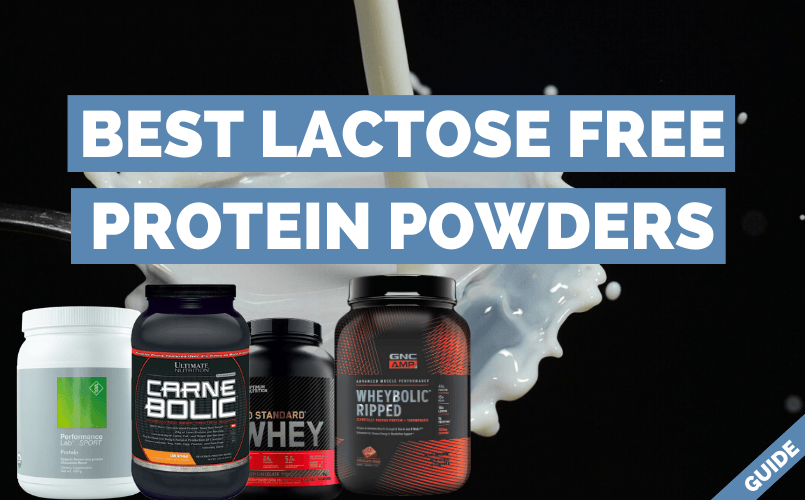
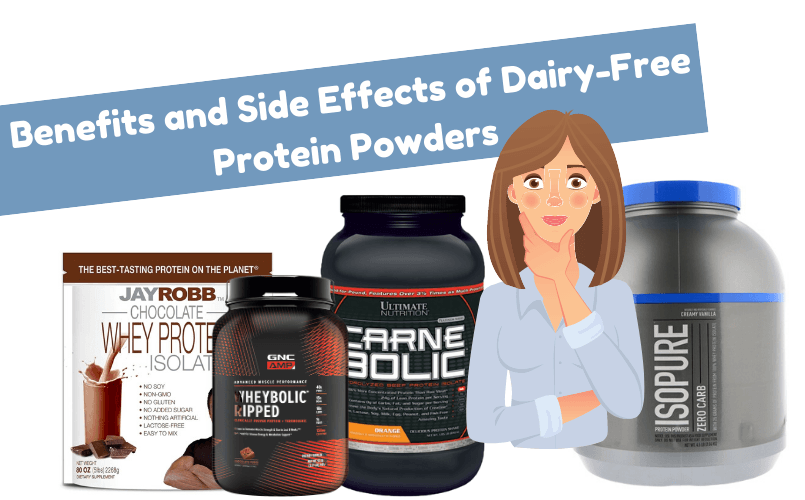
 You might be allergic to the protein, bone broth, or egg white protein powder – if you are not lactose intolerant, another reason could be that you are probably allergic to the protein itself. Instead of reacting to lactose—which is the milk sugar, you might be reacting to the whey protein lactose or casein. This can cause inflammation in many parts of your body, which causes you to feel bloated or become gassy.
You might be allergic to the protein, bone broth, or egg white protein powder – if you are not lactose intolerant, another reason could be that you are probably allergic to the protein itself. Instead of reacting to lactose—which is the milk sugar, you might be reacting to the whey protein lactose or casein. This can cause inflammation in many parts of your body, which causes you to feel bloated or become gassy.